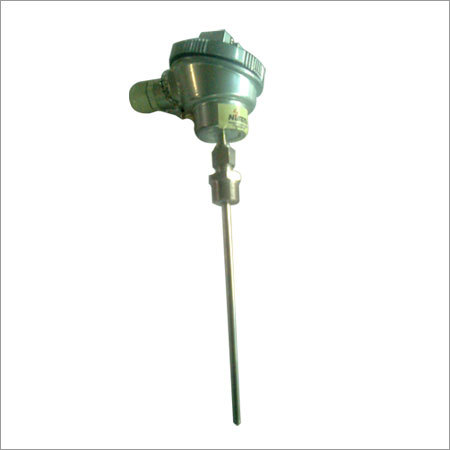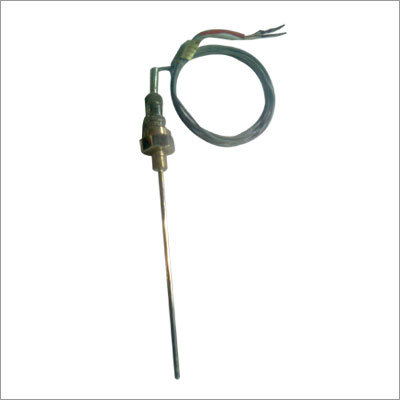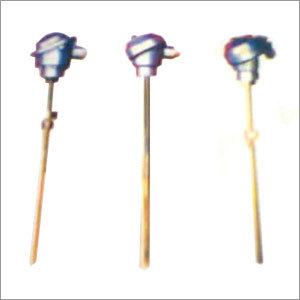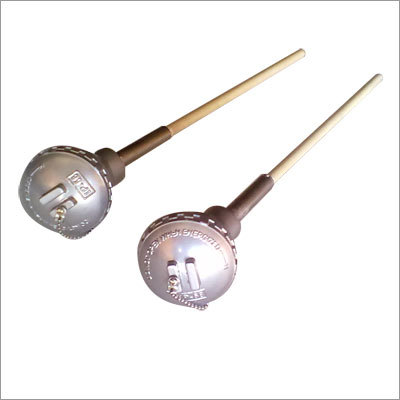Base Metal Thermocouples
Base Metal Thermocouples Specification
- Type
- Base Metal Thermocouple
- Theory
- Seebeck Effect (Thermoelectric Effect)
- Customized
- Yes, available as per specification
- Density
- 8.4 Gram per cubic centimeter(g/cm3)
- Measuring Range
- Wide, suitable for low to high temperature processes
- Melting Point
- Up to 1450C (based on type and sheath material)
- Precision
- High precision for industrial use
- Protecting Tube Material
- Stainless Steel, Inconel, Ceramic
- Sensor Type
- Type J, K, T, E (Base Metal Thermocouple types)
- Size
- Standard and customized sizes available (typically 3mm to 20mm OD)
- Tensile Strength
- High, suitable for process applications
- Tolerance
- Class 1, 1.5C to 2.5C (according to ANSI/IEC standards)
- Wire Length
- Customizable as per application requirement
Base Metal Thermocouples Trade Information
- Minimum Order Quantity
- 1 Piece
- FOB Port
- Udaipur
- Supply Ability
- Piece
- Delivery Time
- 3-20 Days Days
- Packaging Details
- As per product
- Main Domestic Market
- Rajasthan
- Certifications
- ISO
About Base Metal Thermocouples
To cater to the diverse requirements of our precious customers, we are engaged in manufacturing, supplying and trading high quality Base Metal Thermocouples. These products are manufactured using finest quality material that is sourced from reliable and trusted vendors market. Latest machines are employed in the manufacturing process following industry standards & norms. Clients can avail Base Metal Thermocouples from us at nominal prices.
Precise and Reliable Temperature Sensing
Designed for industrial applications requiring dependable temperature monitoring, base metal thermocouples utilize quality insulating materials like ceramic beads and mineral insulation. They offer rapid detection, high tensile strength, and are manufactured in both standard and customizable lengths and sizes for seamless integration into new or replacement installations.
Versatile Mounting and Connection Options
These thermocouples can be mounted using threaded, flange, or compression fittings to suit process requirements. Adjustable and movable process connections enhance installation flexibility, making them ideal for varied industrial workflows and environments where adaptability is key.
Accredited Calibration and High Protection
Calibration can be tailored to NIST or other accredited standards, ensuring reliable and consistent performance. With protection ratings up to IP67, they are engineered to withstand demanding process conditions, offering peace of mind in high-temperature and challenging environments.
FAQs of Base Metal Thermocouples:
Q: How do base metal thermocouples achieve high precision in temperature measurement?
A: These thermocouples utilize the Seebeck Effect and high-quality insulating materials such as ceramic beads, mineral insulation, and fiberglass to ensure accurate and reliable temperature readings. Precision is maintained by adhering to ANSI/IEC class 1 tolerance standards, providing measurements within 1.5C to 2.5C.Q: What are the available insulation and sheath material options for these thermocouples?
A: Customers can choose from ceramic bead, mineral insulated, or fiberglass insulation, while protecting tube materials include stainless steel, Inconel, or ceramic depending on the required temperature range and application conditions.Q: When should I select a grounded, ungrounded, or exposed junction type?
A: A grounded junction provides faster response times and noise protection, ideal for dynamic processes. Ungrounded junctions are recommended for applications where electrical isolation is important. Exposed junctions offer the quickest response but should be used where direct exposure is safe and suitable.Q: Where are base metal thermocouples commonly used?
A: These probes are widely utilized in chemical plants, petrochemical facilities, power generation environments, and metal processing industries due to their durability and adaptable design. Their high temperature range and customizable features make them suitable for various industrial process applications.Q: What is the process for obtaining a custom-sized thermocouple probe?
A: Clients can specify desired sheath diameters (3mm to 20mm), probe lengths, insulation types, and connection fittings. The manufacturer, service provider, supplier, or trader in India will work to deliver a solution tailored to your application requirements, including calibration and accessories if needed.Q: How does the ambient temperature limit affect thermocouple installation?
A: The ambient temperature limit, typically up to 85C for head/cable connections, ensures that electronic components remain safe and functional. For higher process temperatures, only the probe and sheath are exposed, while the connection head or cable should remain within the specified ambient range.Q: What are the benefits of choosing a thermocouple with IP65 or IP67 protection class?
A: Thermocouples with IP65/IP67 ratings offer enhanced resistance to dust, moisture, and harsh industrial environments, reducing maintenance requirements and improving reliability during continuous operation.

Price:
- 50
- 100
- 200
- 250
- 500
- 1000+
More Products in Metallic Thermocouples Category
B Type Thermocouple
Minimum Order Quantity : 1 Piece
Tensile Strength : High (suitable for industrial applications)
Precision : High accuracy for temperature measurement
Density : 20 Gram per cubic centimeter(g/cm3)
Customized : Available as per user requirements
Measuring Range : 600C to 1700C
Type R Thermocouple
Minimum Order Quantity : 1 Piece
Tensile Strength : High durability, standard for thermocouple use
Precision : High accuracy, suitable for industrial measurements
Density : 21.5 Gram per cubic centimeter(g/cm3)
Customized : Available as per requirements
Measuring Range : 0C to 1600C
S Type Thermocouples
Minimum Order Quantity : 1 Piece
Tensile Strength : High (suitable for industrial application)
Precision : High
Density : 21.45 Gram per cubic centimeter(g/cm3)
Customized : Yes, available as per specifications
Measuring Range : Up to 1600C
We Mainly Deal In Udaipur, Rajasthan.

 Send Inquiry
Send Inquiry Send Inquiry
Send Inquiry



